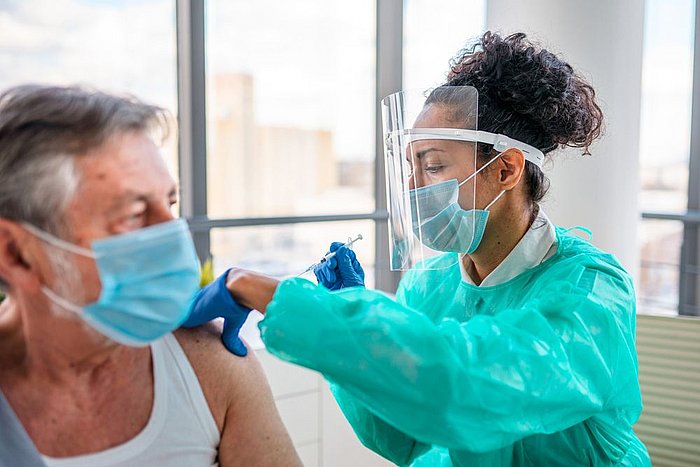Changes in labor law 2022
Update Employment Law February 2022
In the new year, the Corona pandemic continues to dominate the headlines, our actions and also legislation. In addition to an extension of the Corona special regulations, however, the last regulations of the old government on bureaucracy reduction, digitalization and minimum wage will also take effect in 2022. An overview of the most important changes:
Compulsory Vaccination against Corona
Employees of healthcare facilities (in particular: hospitals, doctors' offices, nursing homes, care services) must either be fully vaccinated or recovered from March 15, 2022. This rule does not apply if the employees cannot receive a vaccination for medical reasons (contraindication). By March 15, 2022, employees must provide their employers with the appropriate proof.
Employers are required to report to the relevant health authority if they do not receive proof by March 15, 2022, or if they have doubts about its authenticity. This obligation is subject to a fine and should therefore be taken seriously, not only for reasons of health protection.
The health authority can disqualify respective employees from their work if there is no proof of vaccination, recovery or contraindication. Conversely, this means in particular that employers cannot use to the lack of proof of vaccination to justify disciplinary actions unless the health authority has disqualified the employee.
The situation is different for new hires: From March 16, 2022, employers of health care facilities may only hire new employees if they provide proof of vaccination, recovery or contraindication. This should be taken into account when initiating a contract in order to avoid fines.
Extension of current Corona regulations
The current Corona regulations in Labor Law have mostly been extended until March 2022.
For now, the special health protection regulations will continue until March 19, 2022. For employers, this continues to mean the following:
- In workplaces, 3G applies: Employers and employees must carry proof of vaccination or recovery or a negative corona test when entering the workplace. Employers must control compliance and document their control.
- Home office obligation: In the case of office work or similar activities, the employer is obligated to offer the employees the opportunity to carry out these activities at their home if there are no compelling operational reasons to the contrary. The employees must accept this offer if there are no reasons not to.
- Employers must inform their employees about the risks of COVID-19 disease and vaccination options, assist company physicians in offering vaccinations, and release employees from work for vaccinations.
- Employers are required to offer rapid antigen or self-testing in their workplaces at least twice a week for all employees present.
- Employers must have a hygiene concept (including regulations on the obligation to wear masks, prevention of personal contact and use of the room only by individual persons), adapt this to changing situations and inform the employees about it.
The payment period for the tax-free Corona bonus of maximum EUR 1,500 has been extended: this bonus must now be paid by the end of March 2022. Condition continues to be that the payment is made in addition to the salary owed anyway and to mitigate the consequences of the Corona crisis. Interestingly, the tax-free maximum amount can be granted regardless of the number of hours worked, i.e. also to part-time employees.
The special regulations on short-time allowance have also been extended until March 31, 2022: The entitlement to short-time allowance exists if at least 10 percent of employees have a work loss of more than 10 percent. Temporary workers will also continue to be included. Half of the social security contributions are reimbursed for the hours lost. Full reimbursement is provided if employees participate in subsidized training. Employees whose entitlement to short-time allowance arose by the end of March 31, 2021 can receive short-time allowance for up to 24 months, up to the end of March 31, 2022 at the latest. Otherwise, the period of entitlement is again limited to 12 months. Finally, employees who have either acquired an entitlement to short-time allowance by March 31, 2021, or who have been on short-time allowance for the first time since April 2021, receive an increase to 70 percent (or 77 percent for households with children) of net pay from the fourth month of receipt, and to 80 (or 87) percent from the seventh month. Until March 31, 2022, it will continue to be possible during short-time work to earn additional income in a new mini-job in accordance with Section 8 (1) no. 1 of the Forth German Social Security Code (SGB IV) without such income being deducted from the short-time allowance.
Finally, the number of children sick days in 2022 remains elevated at 30 days per parent per child.
In particular, works meetings, meetings of works councils and conciliation bodies can continue to take place online.
Whether employees will again be able to claim a home office allowance for tax purposes in 2022, on the other hand, is still unsure. This will presumably depend on the progress of the pandemic.
Digital certificate of incapacity for work
Digitization continues thanks to the Third Bureaucracy Relief Act, which was already passed in 2019 but has only now come into full force. Doctors are now required to digitally report periods of incapacity for work to health insurances. The latter make the information available to employers digitally for retrieval: From July 1, 2022, the obligation to submit a certificate of incapacity for work to the employer will then no longer apply for those insured under the statutory health insurance scheme. What remains is the obligation of employees to report sick immediately. And: Until further notice, the doctor will issue a certificate of incapacity for work to the employee for documentation purposes.
In this respect, employers should adapt their sample employment contracts.
Electronic registration of unemployment
Also passed on May 20, 2020, but only coming into force on January 1, 2022, is the amendment to Section 38 (1) SGB III. Thanks to the deletion of the word "in person" in the regulation on unemployment registration, electronic unemployment registration is now also permitted for the first time. However, this form of unemployment registration requires the use of the so-called "online ID function" of the ID card.
Employers should adapt their sample texts in termination letters and cancellation agreements to the new legal situation in order to comply with their notification obligations correctly.
Facilitation of status determination procedures:
Beginning April 1, 2022, status determinations will be facilitated by the following:
- In the future, only the employment status (dependent employment or self-employment) will be determined instead of the insurance obligation in health or pension insurance.
- Determination of employment status is possible even before starting work.
- A group determination for equal contractual relationships will be possible.
- An oral hearing is possible in the objection proceedings.
All changes are aimed at simplifying and speeding up procedures. It remains to be seen whether these goals will be achieved.
Minimum Wage:
The minimum wage has already risen from the previous level of 9.60 euros to 9.82 euros as of January 1, 2022. From July 1, 2022, the minimum wage will then rise to 10.45 euros per hour, as proposed by the Minimum Wage Commission. This will be a significant step towards the minimum wage of 12.00 euros per hour planned by the traffic light coalition from October 1, 2022 (see Update Employment Law January 2022).
The new minimum training allowance under Section 17 BBiG also applies from January 1, 2022:
- 1st year of training: 585 euros,
- 2nd year of training: 690.30 euros,
- 3rd year of training: 789.75 euros,
- 4th year of training: 819 euros.
The next increase will then follow from January 1, 2023 to 620 euros (1st year), 731.60 euros (2nd year), 837 euros (3rd year) and 868 euros (4th year).

![[Translate to English:]](/fileadmin/_processed_/a/5/csm_Kettner__Dr._Eva_print_e54f4b23e7.jpg)









